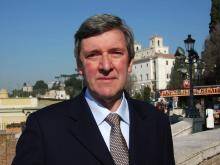The Extraordinary Assembly of the Synod of Bishops on the Family, which closed on Oct. 19, approved a final report that, with the pope’s endorsement, will soon be sent to the 114 Catholic bishops’ conferences worldwide and to the patriarchates and major archbishops of the Eastern Catholic churches.
The sending of that text from the secretariat of the synod to the local churches marks the opening of a most important phase in the new synodal process established by Pope Francis in 2013. The report, which will be accompanied by a questionnaire, is meant to serve as a working document for the discussion that is to take place in the local churches over the next year.
Bishops are expected to discuss this report not only among themselves in bishops’ conference meetings but also in their own dioceses, with their priests, the lay faithful and especially with families.
Archbishop Bruno Forte, the Italian theologian whom Pope Francis appointed special secretary of the 2014 meeting of the synod, stated this publicly on Oct. 13. He recalled that the major progress at the Second Vatican Council (1962–65) came between its first and second sessions, when the bishops returned home and discussed the topics under debate not only among themselves but also with theologians and the faithful in their local churches. He believes something similar can happen with this Synod of Bishops on the Family, which is being conducted in two separate sessions, one year apart. “We hope that in this year the laity will make their voices heard, and that the bishops listen,” he said.
The cardinal archbishop of Paris, André Vingt-Trois, one of the president-delegates at the October meeting, revealed that in preparation for the 2014 synod he had set up small groups (around a dozen people in each group) in every parish throughout his archdiocese to discuss the themes that were on the agenda for that synod. “I will now do the same in preparation for the 2015 synod,” he told a press conference in the Vatican.
Cardinal Péter Erdö (Hungary), who had the key role of relator at the 2014 synod, said he had done something similar in preparation for the that gathering. He had groups of married couples in almost every parish in his Budapest archdiocese whom he asked to discuss the themes for the recently concluded assembly. He plans to do likewise for the next one.
Archbishop Forte emphasized the importance of discussing the 2014 synod’s final report over the next year at the local church level and said this could really enrich the debate in the whole church and could well produce new ideas and proposals, even some hitherto not considered. He said the bishops’ conferences in the different countries are expected to send feedback from these discussions in their local churches to the Synod’s secretariat in the Vatican in due course. These contributions will then be used in the drafting of the working document for the 2015 synod.
Next year’s synod will be held from Oct. 4 to Oct. 25. It will be an ordinary general assembly, which means many more bishops will participate than in this year’s meeting, which was an extraordinary assembly. They will be elected by the bishops’ conferences or the corresponding bodies in the Eastern Catholic churches.
Cardinal Lorenzo Baldiserri, secretary general of the Synod of Bishops, said the theme chosen for the next meeting is a broad one: “The vocation and mission of the family in the church and in the contemporary world.” Cardinal Erdö, in his midway report on Oct. 13, said, “The dialogue and meeting that took place in this assembly will have to continue in the local churches, involving their various components, in such a way that the perspectives that have been drawn up might find their full maturation in the work of the next ordinary general assembly.”
It is clear, then, that the next 12 months will not only be an important and challenging period for the local churches; it can also be a very enriching one. Their contributions can make a difference to the final outcome of the meeting in 2015, which is expected to come up with proposals for the pastoral response of the Catholic Church to the many different and sometimes complex questions that have been identified in the final report of the assembly just ended. Next year’s general assembly of the Synod of Bishops will present these proposals to Pope Francis, and he will make the final decisions.








